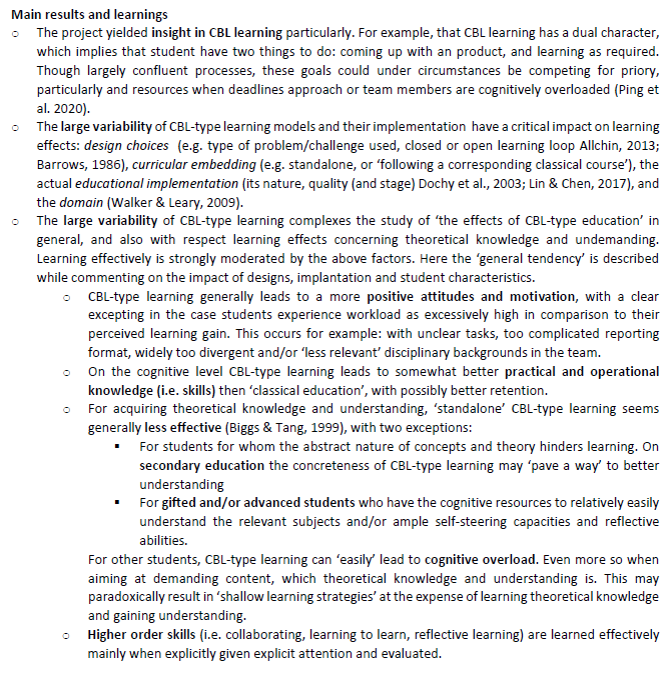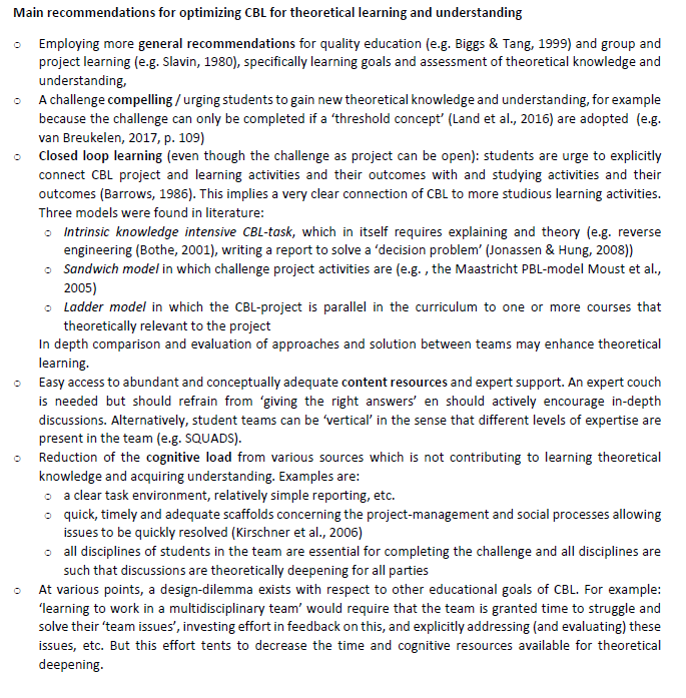Project introduction and background information
Challenge Based Learning (CBL hereafter) is an educational concept to modernize engineering education. In CBL, students build their knowledge, develop skills and professional attitudes by taking on open-ended real-life challenges in interdisciplinary teams. These challenges reflect professional engineering practice, and are often related to the major challenges of our time. Research has identified several positive effects on professional preparation, motivation and positive attitudes toward STEM and the acquisition of practical knowledge and skills. It also brings education closer to (professional) reality. But how is theoretical knowledge acquired by doing CBL projects?
Objective and expected outcomes
Objective
This project will address the issue of knowledge acquisition in challenge based learning in a practical way. The aim is to inspire and support teachers/projects creating challenge based learning that also want their students to acquire theoretical integrated knowledge and understanding. This can be subjects/courses already taught in a more-or-less challenge based form, but also projects that re-design a subjects/courses currently classically taught into a 'challenge based courses'.
As indicated above, this is partly done by making available the results and ideas found in literature in a practical form for teachers throughout TU/e. Secondly, it is done by the in-depth analysis (structure, completeness etc.) of the knowledgebase and understanding students acquire as a result of challenge based education and its particular characteristics.
Expected outcomes
- Improved challenge based education for the subjects involved. That is: challenge based education optimized for acquiring better theoretical knowledge/understanding (this involves both the tasks and the teaching behavior; the latter being included but not emphasized in this project).
- Best practices: both tested and theoretically underpinned from experiences at AP/CT/EE/ME.
- Formats for challenge based learning to be used at other departments also. Understanding of the merits and affordances derived from the projects/subject included. This leads to a) a 'model' of deepened challenge based education, and b) practical guidelines for creating deepened challenge based education, that can be used for other courses in other departments.
- Insight in the production of 'theoretical knowledge' in challenge based learning (PhD level-to be discussed). Thus contributing to building"up a body of knowledge/expertise in creating/implementing challenge based learning at TU/e.
Results and learnings
Only a few results are shown below. Please contact R.Taconis@tue.nl for more information or advice.

Recommendations
Only a few results are shown below. Please contact R.Taconis@tue.nl for more information or advice.

Practical outcomes
- Taconis, R. (2021). Acquiring Theoretical Knowledge in Challenge Based Learning. Proceeding of the 49th SEFI Annual Conference 2021 (13 – 16 September 2021).
- Taconis, R. & Hobbelen, H., (2021). Building theoretical knowledge and understanding in Challenge Based Learning projects. Report.
- Meetings: Study day TN (approx. 50 TU/e teachers), Study day EE (approx. 40 TU/e teachers), contribution to E3 development day at TU/e (approx. 15 participants)
Other products:
- Online tool: Design Your CBL (version 1.7) – prototype tested for Firefox and Edge
- Taconis, R., Hobbelen, H. & Bekker, T. (2021). A model-based online tool supporting the design of Challenge Based Learning. Proceeding of the 49th SEFI Annual Conference 2021 (13 – 16 September 2021).
